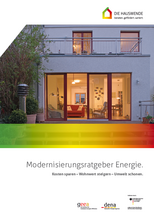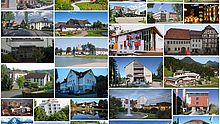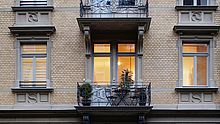The majority of property owners are unaware of how much energy their buildings consume. This was confirmed in a study conducted by dena. Many of them even believe that their house has been state-of-the-art for some time, and that electronic devices account for the lion’s share of energy consumption in a domestic setting. But in actual fact it is the supply of heating that is responsible for by far the largest share of energy consumption in the building sector. Millions of buildings here in Germany must become more energy-efficient if the energy transition is to succeed. It is for this reason that dena uses campaigns such as “The Building Transition” to provide homeowners with relevant information on the benefits of energy-efficient building refurbishment, motivating them to leverage savings potential in their own residences.
Energy-efficient refurbishment: benefits for homeowners.
Many energy standards are defined by law for new builds. In contrast, it is largely up to the owners of existing buildings to decide whether or not they wish to invest in energy efficiency. Professional energy-efficient refurbishment brings a number of benefits, including reduced energy consumption, lower costs and a higher property value.
These are good reasons for refurbishment. But it is necessary to create greater awareness among homeowners of these benefits to ensure that the energy transition succeeds. dena shows homeowners the benefits of energy-efficient refurbishment and presents professional solutions.
Information on refurbishment

dena has created a range of offers addressing different target groups for precisely this purpose. It uses information campaigns, online services, brochures and guidelines to raise the awareness of potential savings that are available, and how they can be exploited. For instance, energy-efficient refurbishment can be combined with necessary modernisation measures. This cuts the costs significantly. dena provides clear, dependable and unbiased information on all possible measures. It offers tips on a variety of consulting and funding programmes, developing best-practice solutions that confirm: energy efficiency in the building sector has practical benefits as well.
Information and motivation campaigns
dena cooperates with partners to organise campaigns, for instance The Building Transition: the campaign provides owners of detached and semi-detached houses with detailed information on all aspects of energy-efficient building refurbishment. The initiative also shows consumers where they can find qualified energy experts close by. dena uses innovative formats in addition to simply communicating the facts. For example, the “Refurbishment Heroes” campaign invites homeowners who have already completed their energy-efficient refurbishment to relate their personal experiences in multimedia reports.
Exemplary refurbishment
dena organises pilot projects for certain industries and building types that are intended to encourage others to follow suit. After all, best-practice solutions allow interested parties to appreciate the opportunities at their disposal based on actual cases. Since 2011, dena has accompanied the energy-efficient refurbishment of roughly 400 detached and semi-detached homes and apartment buildings as part of the “Efficient House Pilot Project”.
After energy-efficient modernisation, the residential buildings now use up to 80 percent less final energy than before. In the “Check-in Energy Efficiency” pilot project, dena shows where there is potential for energy saving in hotels and hostels and also shows how they can be used. Selected refurbishment properties are used as examples of economically and ecologically acceptable concepts for the 'hostel of the future' and outline which investments are required. dena launched a similar project in the commercial sector in 2016: The pilot project “Energy-efficient Trade” is designed to show where there is savings potential in commercial buildings and to develop solutions for a practical setting.
The Efficient House database lists buildings all over Germany.




